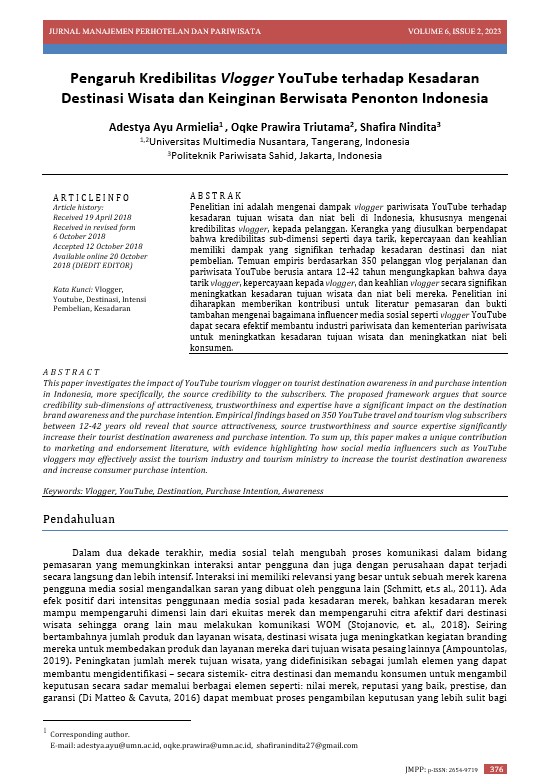Pengaruh Kredibilitas Vlogger Youtube terhadap Kesadaran Destinasi Wisata dan Keinginan Berwisata Penonton Indonesia
DOI:
https://doi.org/10.23887/jmpp.v6i2.60168Keywords:
Vlogger, YouTube, Destinasi, Intensi Pembelian , KesadaranAbstract
Penelitian ini adalah mengenai dampak vlogger pariwisata Youtube terhadap kesadaran tujuan wisata dan niat beli di Indonesia, khususnya mengenai kredibilitas vlogger, kepada pelanggan. Kerangka yang diusulkan berpendapat bahwa kredibilitas sub-dimensi seperti daya tarik, kepercayaan dan keahlian memiliki dampak yang signifikan terhadap kesadaran destinasi dan niat pembelian. Temuan empiris berdasarkan 350 pelanggan vlog perjalanan dan pariwisata Youtube berusia antara 12-42 tahun mengungkapkan bahwa daya tarik vlogger, kepercayaan kepada vlogger, dan keahlian vlogger secara signifikan meningkatkan kesadaran tujuan wisata dan niat beli mereka. Penelitian ini diharapkan memberikan kontribusi untuk literatur pemasaran dan bukti tambahan mengenai bagaimana influencer media sosial seperti vlogger youtube dapat secara efektif membantu industri pariwisata dan kementerian pariwisata untuk meningkatkan kesadaran tujuan wisata dan meningkatkan niat beli konsumen.
References
Aaker, D. A. (1991). Managing brand equity. New York: The Free Press.
Ampountolas, A. (2019). Peer-to-peer marketplaces: A study on consumer purchase behavior. Journal of Hospitality and Tourism Insights, 2(1), 37–54. https://doi.org/10.1108/JHTI-05-2018-0028
Armielia, A. A. (2019). Celebrity endorsement in Japan tourism based on consumer celebrity worship. ULTIMA Management, 10(2), 65–80. https://doi.org/10.31937/manajemen.v10i2.982
Bratu, S. (2019). Can social media influencers shape corporate brand reputation? Online followers' trust, value creation, and purchase intentions. Review of Contemporary Philosophy; Woodside Vol. 18, 154-160. https://doi.org/10.22381/rcp18201910
Chen, C. Y., Chen, T.-H., Chen, Y.-H., Chen, C.-L., & Yu, S.-E. (2013). The spatio-temporal distribution of different types of messages and personality traits affecting the eWOM of Facebook. Natural Hazards, 65(3), 2077–2103. https://doi.org/10.1007/s11069-012-0468-y
Chen, J. L., & Dermawan, A. (2020). The influence of YouTube beauty vloggers on Indonesian consumers’ purchase intention of local cosmetic products. International Journal of Business and Management, 15(5), 100. https://doi.org/10.5539/ijbm.v15n5p100
Cox, D. F., & Bauer, R. A. (1964). Self-confidence and persuasibility in women. Public Opinion Quarterly, 28(3), 453–466. https://psycnet.apa.org/doi/10.1086/267266
Dawson, S., Knapp, D., & Farmer, J. (2012). Camp war buddies: Exploring the therapeutic benefits of social comparison in a pediatric oncology camp. Therapeutic Recreation Journal, 4, 313–325. http://www.jstor.org/stable/2747017
Dedeoğlu, B. B., van Niekerk, M., Küçükergin, K. G., De Martino, M., & Okumuş, F. (2020). Effect of social media sharing on destination brand awareness and destination quality. Journal of Vacation Marketing, 26(1), 33–56. https://doi.org/10.1177/1356766719858644
Di Matteo, D., & Cavuta, G. (2016). Enogastronomic tourism: Can it mitigate the intangibility of the destination? Streetfood as a new business model for the management of tourist regions. Procedia Economics and Finance, 39, 347–356. https://doi.org/10.1016/S2212-5671(16)30335-5
Erdogan, B. Z. (1999). Celebrity endorsement: A literature review. Journal of Marketing Management, 15(4), 291–314. https://doi.org/10.1362/026725799784870379
Fotis, J., Buhalis, D., & Rossides, N. (2012). Social media use and impact during the holiday travel planning process. In Information and Communication Technologies in Tourism 2012 (pp. 13–24). Springer Vienna. https://doi.org/10.1007/978-3-7091-1142-0_2
Frobenius, M. (2011). Beginning a monologue: The opening sequence of video blogs. Journal of Pragmatics, 43(3), 814–827. https://doi.org/10.1016/j.pragma.2010.09.018
Hermanda,A., Sumarwan, U., Tinaprilla, N. (2019). The effect of social media influencer on brand image, self-concept, and purchase intention. Journal of Consumer Sciences, Vol. 04, No. 02, 76-89.
Hoyer, W. D., & Brown, S. P. (1990). Effects of brand awareness on choice for a common, repeat-purchase product. Journal of Consumer Research, 17(2), 141. https://doi.org/10.1086/208544
Jakarta Post. (2017). Korean bloggers, media companies join famtrip to Central Java. https://www.thejakartapost.com/travel/2017/11/30/korean-bloggers-media-companies-join-famtrip-to-central-java.html
Jellison, J. M., & Gentry, K. W. (1978). A self-presentation interpretation of the seeking of social approval. Personality and Social Psychology Bulletin, 4(2), 227–230. https://doi.org/10.1177/014616727800400210
Keller, K. L. (1993). Conceptualizing, measuring, and managing customer-based brand equity. Journal of Marketing, 57(1), 1. https://doi.org/10.2307/1252054
Kladou, S., & Kehagias, J. (2014). Developing a structural brand equity model for cultural destinations. Journal of Place Management and Development, 7(2), 112–125. https://doi.org/10.1108/JPMD-03-2013-0007
Lee, J. E., & Watkins, B. (2016). YouTube vloggers’ influence on consumer luxury brand perceptions and intentions. Journal of Business Research, 69(12), 5753–5760. https://doi.org/10.1016/j.jbusres.2016.04.171
Leenders, R. T. A. J. (2002). Modeling social influence through network autocorrelation: constructing the weight matrix. Social Networks, 24(1), 21–47. https://doi.org/10.1016/S0378-8733(01)00049-1
Lou, C., & Yuan, S. (2019). Influencer Marketing: How Message Value and Credibility Affect Consumer Trust of Branded Content on Social Media. Journal of Interactive Advertising, 19(1), 58–73. https://doi.org/10.1080/15252019.2018.1533501
Młodkowska, B. (2019). Influencers on Instagram and YouTube and their impact on consumer behaviour. Journal of Marketing and Consumer Behaviour in Emerging Markets, 2019(1), 4–13. https://doi.org/10.7172/2449-6634.jmcbem.2019.1.1
Ohanian, R. (1990). Construction and validation of a scale to measure celebrity endorsers’ perceived expertise, trustworthiness, and attractiveness. Journal of Advertising, 19(3), 39–52. https://doi.org/10.1080/00913367.1990.10673191
Petrosyan, A. (2023). Worldwide digital population 2023. Https://Www.Statista.Com/Statistics/617136/Digital-Population-Worldwide/.
Rosalen, R. (2019). YouTube: Online video and participatory culture. New Media & Society, 21(9), 2095–2096. https://doi.org/10.1177/1461444819859476
Rybaczewska, M., Sparks, L.Chesire, B.J. (2020). YouTube vloggers as brand influencers on consumer purchase behaviour. Journal of Intercultural Management, 12(2), 117–140. Doi: 10.2478/joim-2020-0047
Schmitt, P., Skiera, B., & Van den Bulte, C. (2011). Referral programs and customer value. Journal of Marketing, 75(1), 46–59. https://doi.org/10.1509/jm.75.1.46
Serban, C. (2010). Marketing communication in online social programs Ohanian model of source credibility. Annals of the University of Oradea: Economic Science, 1(1), 778–784. https://www.researchgate.net/publication/49615005
Stojanovic, I., Andreu, L., & Curras-Perez, R. (2018). Effects of the intensity of use of social media on brand equity. European Journal of Management and Business Economics, 27(1), 83–100. https://doi.org/10.1108/EJMBE-11-2017-0049
Stubb, C., & Colliander, J. (2019). “This is not sponsored content” – The effects of impartiality disclosure and e-commerce landing pages on consumer responses to social media influencer posts. Computers in Human Behavior, 98, 210–222. https://doi.org/10.1016/j.chb.2019.04.024
Sugiyono. (2015). Metode penelitian kuantitatif, kualitatif, dan R&D. 2nd ed. CV Afabeta.
Weismueller, J., et.al. (2020). Influencer Endorsements: How Advertising Disclosure and Source Credibility Affect Consumer Purchase Intention on Social Media. Australasian Marketing Journal, 28(4). https://doi.org/10.1016/j.ausmj.2020.03.002
Zhao, C., Shen, H., & Zhang, Y. (2022). The study on the impact of short video tourism Vloggers at social media platform on online sharing intention. Frontiers in Psychology, 13. https://doi.org/10.3389/fpsyg.2022.905002










